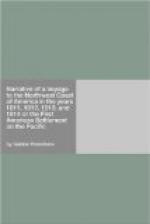[Footnote H: These facts, if they were authenticated, would prove that the Spaniards were the first who discovered the mouth of the Columbia. It is certain that long before the voyages of Captains Gray and Vancouver, they knew at least a part of the course of that river, which was designated in their maps under the name of Oregon.]
The next morning, having ascertained that there was no trading post near the Falls, and Coalpo absolutely refusing to proceed further, alleging that the natives of the villages beyond were his enemies, and would not fail to kill him if they had him in their power, we decided to return to the encampment. Having, therefore, distributed some presents to our host (I mean the young chief with whom we had supped and lodged) and to some of his followers, and procured a supply of fresh salmon for the return voyage, we re-embarked and reached the camp on the 14th, without accidents or incidents worth relating.
CHAPTER IX.
Departure of the Tonquin.—Indian Messengers.—Project of an Expedition to the Interior.—Arrival of Mr. Daniel Thompson.—Departure of the Expedition.—Designs upon us by the Natives.—Rumors of the Destruction of the Tonquin.—Scarcity of Provisions.—Narrative of a strange Indian.—Duplicity and Cunning of Comcomly.
Having built a warehouse (62 feet by 20) to put under cover the articles we were to receive from the ship, we were busily occupied, from the 16th to the 30th, in stowing away the goods and other effects intended for the establishment.




